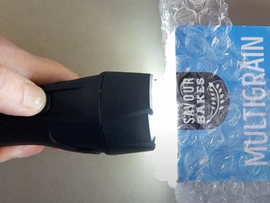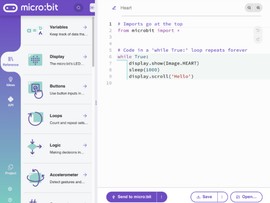BBC micro:bit – the next gen invites school children from across the country to survey their playground
Primary school-aged children across the UK are set to be involved in a national citizen science project to survey their playgrounds using the micro:bit.
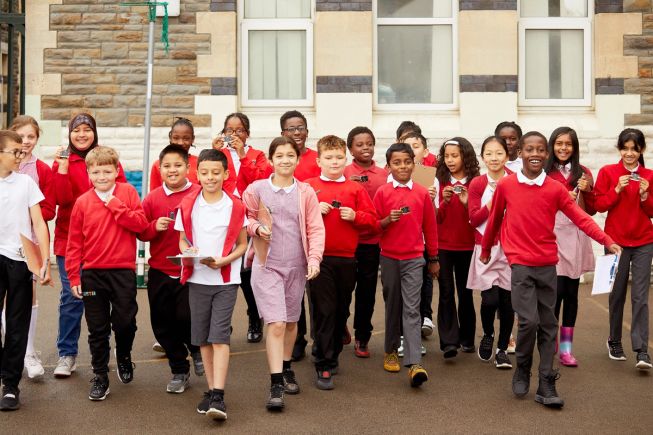
Photo: BBC micro:bit - the next gen playground survey
With the help of their teachers, children aged 7 to 11 years old have an opportunity to use the BBC micro:bit in a unique data science project, to investigate and gather information about their playground. The BBC micro:bit playground survey continues the next gen campaign, following the free giveaway of hundreds of thousands of micro:bits in the autumn term to primary schools, which was made possible thanks to generous support from Nominet. Teachers from schools across the country will be able to submit findings from their class for analysis by the Office for National Statistics.
New resources and tools for teachers
Teachers who receive their BBC micro:bit - the next gen classroom kit can take part by accessing our free online resources:
- Seven new activities
- Introduce the survey with a discussion on the importance of data.
- Use the micro:bit's temperature sensor to compare differences in playground surface temperatures.
- Investigate the biodiversity of plants and animals in your playground with a micro:bit biodiversity counter.
- Measure your playground area, using the micro:bit to help calculate distances.
- Use a brand new program on the micro:bit to track physical activity in the playground.
- Explore machine learning in your classroom, and build your own machine learning model.
- Downloadables
- Worksheets
- Posters
- Certificates
- Support and training
- Join a Getting started with the micro:bit webinar
- Invite a STEM Ambassador to your school
- Find a training session to suit you (both online and regional face-to-face training available)
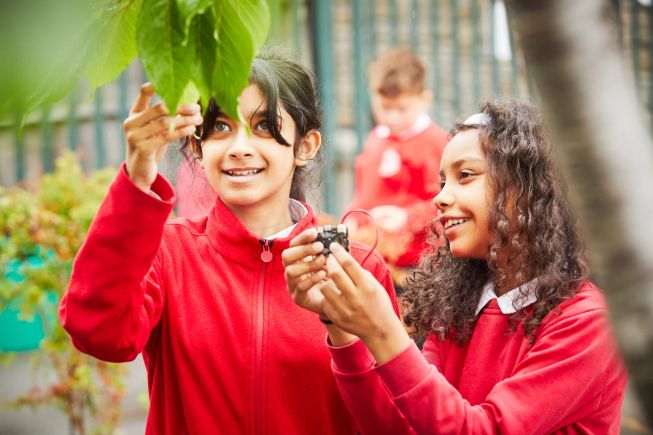
Photo: BBC micro:bit - the next gen playground survey
Real-world, cross-curricular enquiry
The BBC micro:bit playground survey is a series of seven activities. They map to the English, Northern Irish, Scottish and Welsh curricula. The activities help children learn vital data science and digital skills. They cover a broad range of subjects. These include geography, mathematics, science, computing, ICT, PE, understanding the world, and health and wellbeing. Teachers can choose to dip into one, some, or all the activities.
Children will investigate the size, temperature and biodiversity of their playground. They can collect data about the levels of physical activity taking place. They can also train and test their own machine learning model, using data they have collected. Designed in collaboration with Aarhus University, the new tool is designed to help make artificial intelligence (AI) more approachable and fun.
The BBC micro:bit playground survey homepage includes online teacher resources, with step-by-step instructions for every activity. There are worksheets, posters, and certificates that teachers can download for their class. For teachers who want extra support with micro:bits, there is free online and face-to-face training.
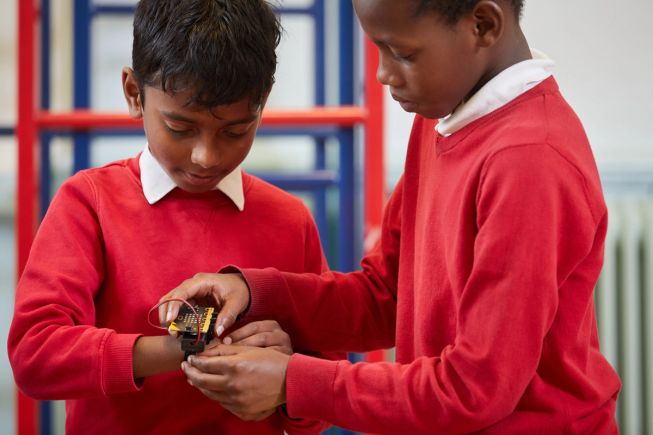
Photo: BBC micro:bit - the next gen playground survey
Plan it into the summer term
To be included in the national results, schools should upload their class data by 31 July. This data will be analysed by the ONS and published in the autumn term 2024.
For more information about the BBC micro:bit playground survey, visit the homepage on BBC Teach.
Discovering the nation’s playgrounds
This project is made possible thanks to the generous support of our partners, including BBC Children's and Education, Nominet, ONS, Aarhus University and many more – find out about them all here.

We are delighted to be working alongside BBC Education and the ONS on this survey that will investigate the nation’s school playgrounds and give children the chance to try out AI. We hope it will not only capture the imagination of children across the UK, but also help them to understand more about data science. Our lives are increasingly linked to our day-to-day use of data, especially in the field of machine learning and AI. Children need to understand more about how data works and how it can be used – it’s an essential skill for the future.

Gareth Stockdale, CEO, Micro:bit Educational Foundation

We have been taken aback by the response to our campaign with the Micro:bit Educational Foundation. Almost 90% of UK primary schools registered for their free pack of 30 micro:bits. Now we are asking schools across all four nations to take part in our citizen science project. The survey will engage children in the power of coding, sparking their curiosity about the world around them. We can’t wait to see what they uncover in the summer term!

Jo Claessens, Executive Producer, BBC Children's and Education

It’s fantastic to see so many primary schools across the UK start learning with micro:bits. Using the playground survey to take the micro:bits outside is a great way to put digital skills into practice in the real world. We’re proud to have made this project possible by donating the micro:bits, and we can’t wait to see what children across the UK will uncover.

Eleanor Bradley, Managing Director of Registry and Social Impact, Nominet

In today’s digital society data is everywhere, understanding its value and its potential to help us learn about the world around us has never been more important. The playground survey is a wonderful way for children to get to grips with every aspect of data literacy in a familiar and fun setting – from planning the collection, to recording the data, to analysing it, and then thinking about how to improve it. We’re excited to be part of this and to help UK primary schools discover more about their playgrounds.

Mary Gregory, Interim Director, Population Statistics, ONS

Physical experiences with machine learning will help children get a more intuitive understanding of the possibilities that machine learning technologies provide, as well as the limitations and ethical issues. The design of the machine learning tool is based on our current research into how teachers can engage children in tangible experiences with machine learning. We’re excited to collaborate with the Foundation to bring the tool to this project, and provide synergy between the most recent research, and practices at schools in the UK.

Karl-Emil Kjær Bilstrup, Center for Computational Thinking and Design, Aarhus University
